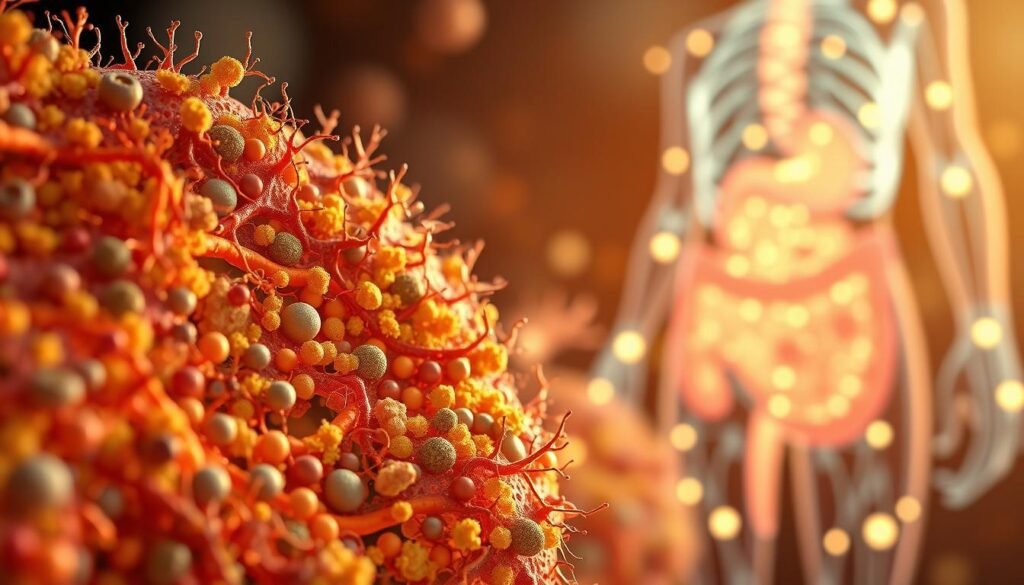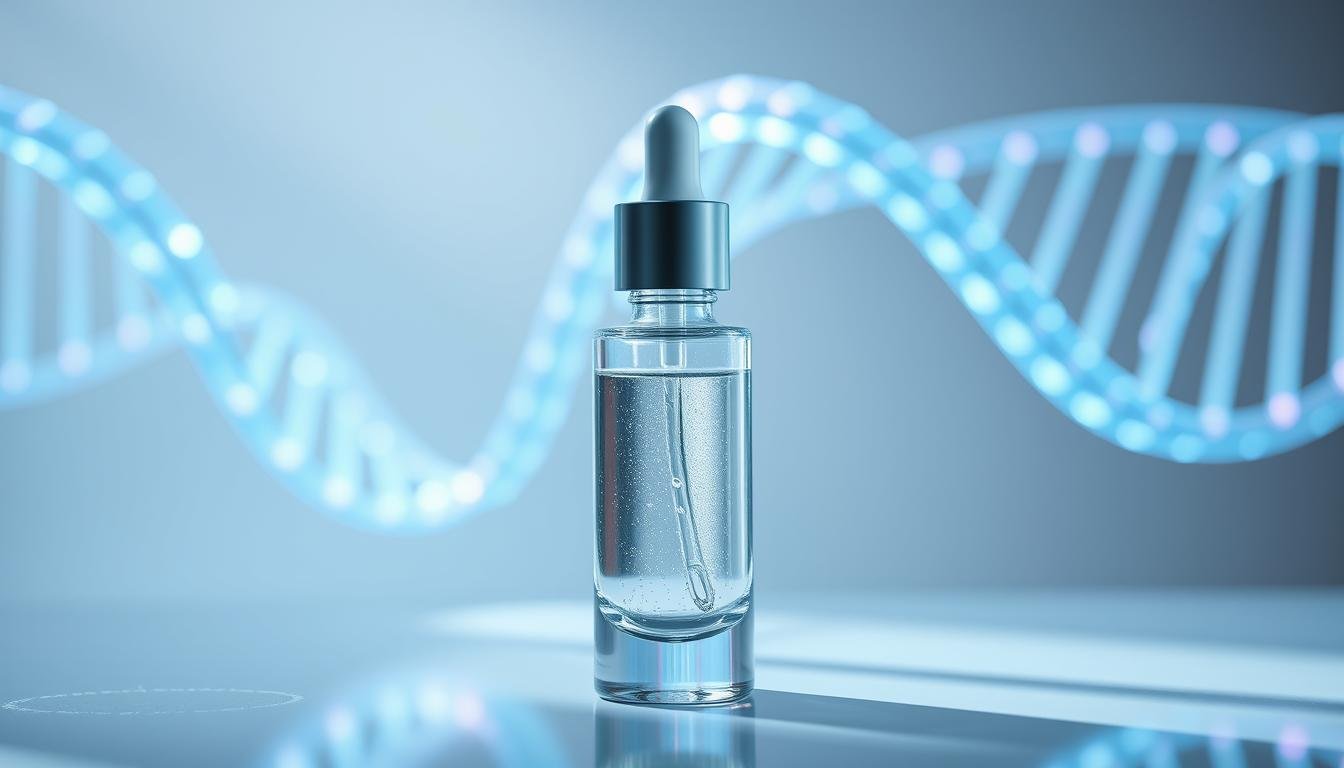Are you eating the right foods for your body? Now, with personalized nutrition, you can make your diet fit your unique genetic makeup and gut health.
By looking at your DNA and microbiome, you can find out the best foods for you. This could lead to better health.
This new way of thinking about food and health is changing. It’s moving away from the old one-size-fits-all idea.
Key Takeaways
- Personalized nutrition plans can be created using DNA and microbiome analysis.
- This tailored approach can lead to better health outcomes.
- Understanding your genetic makeup and gut health is key to optimizing your diet.
- A personalized diet can help address specific health concerns.
- The future of nutrition is moving towards a more personalized approach.
What is Personalized Nutrition?
Personalized nutrition uses genetic testing and microbiome analysis to tailor diets. It aims to improve health and wellness. This method combines genetic info, microbiome data, and nutrition science to create diet plans that meet individual needs.
Understanding the Basics of Customized Diet Plans
Customized diet plans are made based on a person’s genetic profile, microbiome, and lifestyle. Healthcare experts analyze genetic markers and microbiome data. They then give personalized health recommendations.
“The future of nutrition is not just about eating healthy, it’s about eating right for your body,” experts say. This method sees that everyone’s nutritional needs are different. They are shaped by genetics and microbiome.
Benefits of Tailoring Nutrition to Individual Needs
Tailoring nutrition to individual needs has many benefits. It leads to better health, easier weight management, and overall well-being. By following a personalized diet plan, people can see big health improvements. It meets their specific nutritional needs.
- Optimized nutrient intake based on genetic and microbiome data
- Improved management of health conditions through targeted dietary interventions
- Enhanced overall well-being and quality of life
As personalized nutrition grows, it’s clear that a one-size-fits-all diet is outdated. By focusing on genetic wellness and personalized health, people can make better health choices. They can support their unique needs.
The Role of DNA in Nutrition
DNA analysis for diet is changing how we think about nutrition and health. It lets us create diets that are just right for each person. This can help prevent some diseases.
How Genetic Testing Influences Dietary Choices
Genetic testing for nutrition shows how our bodies handle different nutrients. Some people can’t break down certain vitamins or fats well because of their genes. This testing helps find the right foods for each person’s genetic makeup.
Key areas where genetic testing can influence dietary choices include:
- Understanding lactose intolerance and dairy consumption
- Identifying genetic predispositions to certain nutrient deficiencies
- Tailoring diets based on genetic variations in metabolism
Key Genetic Markers Affecting Metabolism
Many genetic markers affect how we metabolize nutrients. For example, the FADS1 gene affects omega-6 fatty acid metabolism. The MTHFR gene impacts folate metabolism.
By studying these markers, we can make personalized nutrition plans. This makes diets more effective and helps us understand the link between genes and nutrition better.
As we learn more about genetics and nutrition, genetic testing will play a bigger role. It will help in creating personalized diets for better health.
Introduction to DNA Diet Tests
DNA diet tests are changing how we think about food. They give us personalized eating plans based on our genes. This new field mixes genetics and nutrition to help us know what foods are best for us.
How DNA Tests Work and What They Measure
DNA tests for nutrition look at certain genetic markers related to how we react to food. You just need to spit or swab your cheek to send in a sample. Then, a lab analyzes it to tell you how your body handles nutrients like carbs, fats, and proteins.
Key aspects measured by DNA diet tests include:
- Genetic variations affecting metabolism
- Nutritional deficiencies or sensitivities
- Optimal dietary patterns based on genetic predispositions
Popular DNA Testing Services for Nutrition
Many companies offer DNA tests for nutrition and diet planning. Some top services are:
- 23andMe: Known for its detailed genetic analysis, 23andMe gives dietary advice based on your genes.
- DNAfit: This service offers personalized nutrition and fitness plans based on genetic testing.
- Genoo: Genoo provides detailed genetic analysis and tailored dietary advice.
When picking a DNA testing service, think about a few things. Look at how detailed the genetic analysis is, how accurate the diet advice is, and if they offer extra support or counseling.
Exploring the Microbiome
Our bodies are home to trillions of microorganisms, known as the microbiome. They play a big role in our health. This includes digestion and how our immune system works.
What is the Human Microbiome?
The human microbiome is made up of many microorganisms living in and on us. These microbes do more than just exist. They help us by aiding in nutrient absorption and producing vitamins. They also protect us from harmful pathogens.
Key Components of the Microbiome:
- Firmicutes and Bacteroidetes, two main types of bacteria, are key for energy and metabolic health.
- Probiotics, or “good” bacteria, keep our gut healthy and support digestion.
- Prebiotics, non-digestible fibers, feed the good microbes, helping them grow.
How Gut Health Affects Overall Well-being
Gut health is linked to our overall well-being. A balanced gut microbiome is vital for nutrient absorption and immune function. It even affects our mental health. An imbalance can cause issues like obesity, diabetes, and mental health problems.

The Impact of Gut Health on Overall Health:
- A healthy gut helps digest and absorb nutrients, keeping us nutritionally sound.
- The gut-brain axis, a network between the gut and brain, affects mood and thinking.
- A balanced gut is key for a strong immune system, fighting off infections and diseases.
By focusing on microbiome-eating practices, like eating probiotics and prebiotics, we can improve our gut health. This can greatly benefit our overall well-being.
Microbiome-Eating: A New Trend
The idea of microbiome-eating is simple yet powerful. It’s about eating foods that help your microbiome. This trend helps improve your health by focusing on good gut bacteria.
Incorporating Probiotics and Prebiotics into Your Diet
To start, you need to know about probiotics and prebiotics. Probiotics are good bacteria and yeasts for your gut. Prebiotics are fibers that feed these good bacteria, helping them grow.
- Probiotic-rich foods include yogurt, kefir, sauerkraut, and kimchi.
- Prebiotic-rich foods include asparagus, bananas, onions, and garlic.
Foods that Promote a Healthy Microbiome
Other foods also support a healthy microbiome. These include:
- High-fiber foods like whole grains, legumes, and vegetables.
- Polyphenol-rich foods such as berries, green tea, and dark chocolate.
- Omega-3 fatty acids found in fatty fish, flaxseeds, and walnuts.
Eating these foods helps create a diverse and resilient gut microbiome. This is key for your health and well-being.
Microbiome-eating is more than just adding foods. It’s also about avoiding bad foods like processed and high-sugar ones. By choosing wisely, you can use your microbiome to boost your health.
Genetic Wellness: A Holistic Approach
Genetic wellness is a holistic approach that combines genetics and lifestyle for better health. It has become more popular as people look for health advice that fits them.

The Intersection of Genetics and Lifestyle Choices
Our genes and lifestyle choices are connected in a complex way. Our genetic makeup affects how we handle different diets and exercise. For example, some people might metabolize certain nutrients better.
Lifestyle choices, like what we eat and how active we are, can change how our genes work. This mix of genetics and lifestyle is key to our overall health and wellness.
- Diet can change how our genes work, affecting our health.
- How much we exercise can impact our metabolic health, which is partly genetic.
- Managing stress can affect our hormones, which are influenced by our genes.
Personalized Supplements for Optimal Health
Personalized supplements are getting more popular in genetic wellness. They are made to fit an individual’s genetic needs, aiming to improve health.
| Supplement Type | Genetic Marker | Health Benefit |
|---|---|---|
| Omega-3 Fatty Acids | FADS1 Gene | Heart Health |
| Probiotics | Lactase Gene | Gut Health |
| Vitamin D | VDR Gene | Bone Health |
Healthcare providers can suggest specific supplements based on an individual’s genetic markers. This helps support optimal health.
The Science Behind DNA and Nutrition
DNA analysis for diet is getting more popular. People want to know how their genes affect their diet needs. New genetic testing technologies help understand these connections.
The link between genes and nutrition is complex. It involves many genes and environmental factors. Studies show that genes can greatly affect how we process nutrients, impacting our health and disease risk.
Research Supporting Genetic Influences on Nutrition
Many studies show genes play a big role in our diet needs. For example, research on lactose intolerance genes helps find who should avoid lactose. This shows how genetic testing can guide diet choices.
Other studies look at how genes affect nutrient metabolism. They find that certain genes can change how we absorb vitamins and minerals. This supports using genetic testing to make diet plans that fit our genetic makeup.
| Genetic Marker | Nutritional Impact | Dietary Recommendation |
|---|---|---|
| Lactose Intolerance Gene | Reduced ability to digest lactose | Avoid lactose-containing products |
| MTHFR Gene Variant | Altered folate metabolism | Increase intake of folate-rich foods or supplements |
| APOE Gene Variant | Increased risk of heart disease | Follow a heart-healthy diet, low in saturated fats |
Limitations of Current Science in Personalized Nutrition
Personalized nutrition based on DNA has made big strides. But, there are still big challenges. One is understanding genetic data, as many genes are involved in nutrition.
Also, lifestyle and environment greatly affect our health. This makes it hard to just look at genetics. More research is needed to combine genetic, environmental, and lifestyle data for better diet plans.
Despite these challenges, using genetic testing in nutrition could change how we eat and stay healthy. As research improves, we’ll see more tailored nutrition plans.
Choosing the Right Nutrition Plan
Creating a good nutrition plan means knowing your genetic traits, what you like to eat, and your health goals. A personalized diet plan is made just for you. It fits your unique genetic makeup, lifestyle, and nutritional needs.
Factors to Consider: Lifestyle, Preferences, and Goals
When making a personalized nutrition plan, think about a few key things. These include:
- Lifestyle: Your daily activities, work hours, and exercise.
- Dietary Preferences: What you like and dislike to eat, and any food restrictions.
- Health Goals: Your aims, like losing weight, getting healthier, or managing a health issue.
A leading nutrition expert says, “A good nutrition plan is one that you can stick to and fits your unique needs.”
“The future of nutrition is about making it personal. It considers your genes, environment, and lifestyle.”
Working with Nutritionists and Genetic Counselors
Working with nutritionists and genetic counselors can really help. They offer insights into making a personalized diet plan. They use genetic data and look at your microbiome health to give you specific advice.
The steps are:
- Initial Consultation: Talk about your health goals, what you like to eat, and your lifestyle.
- Genetic Testing: Look at your genetic data to understand your nutritional needs.
- Personalized Recommendations: Make a diet plan that’s just for you based on the analysis.
By thinking about these things and working with experts, you can make a nutrition plan. It will meet your dietary needs and help you reach your health and wellness goals.
Real-Life Success Stories
Many people have seen big health improvements by using DNA diet tests and eating for their microbiome. Their stories show how a diet plan made just for them can change lives. It’s all about finding the right food for your body.
Testimonials from Individuals Who Tried DNA Diets
People all over are talking about how DNA diet tests have helped them. Sarah, for example, lost a lot of weight and felt more energetic. She followed a diet plan made just for her genes.
- Weight Loss: Many have lost a lot of weight.
- Improved Energy: They feel more alive and less tired.
- Better Digestion: They have fewer stomach problems.
John also made big changes. He managed his blood sugar better by eating based on his DNA. This helped him avoid getting type 2 diabetes.
Transformational Impacts on Health and Lifestyle
Using DNA diet tests and eating for your microbiome does more than just improve your health. It can change your whole life. People say they eat better, think clearer, and feel happier.
- They eat more healthily and sustainably.
- They have better mental focus and less worry.
- They live a better life overall.
Emily, for instance, cut down on bloating and got better skin. She says eating for her microbiome made a huge difference. It helped her gut health.
These stories show how DNA diet tests and eating for your microbiome can really change your life. By using genetic information to make a diet plan, people can see big improvements in their health and happiness.
Future of Personalized Nutrition
Advances in DNA and microbiome testing are changing personalized nutrition. These technologies will shape our diet understanding and interaction.
Emerging Technologies in DNA and Microbiome Testing
The genetic testing field is growing fast. Next-generation sequencing (NGS) lets us deeply analyze our genes. It shows how genes affect how we process nutrients.
Microbiome testing is getting better too. 16S rRNA sequencing and other methods help us understand our gut microbes. They show how our gut health affects us.
Trends Shaping the Future of Dietary Recommendations
Several trends are changing dietary advice. These include:
- Increased use of AI and machine learning to analyze genetic and microbiome data.
- Growing emphasis on preventive healthcare through personalized nutrition.
- Integration of wearable technology and mobile apps to track dietary habits and health metrics.
The future of personalized nutrition will also be influenced by a better understanding of how genetics and the microbiome interact. Research is ongoing into how specific genetic variants affect nutrient metabolism and how the microbiome influences health outcomes.
| Trend | Description | Impact |
|---|---|---|
| AI and Machine Learning | Advanced data analysis for personalized recommendations. | More precise dietary advice. |
| Preventive Healthcare | Focus on preventing disease through diet. | Improved overall health and well-being. |
| Wearable Technology | Tracking dietary habits and health metrics. | Enhanced monitoring and adjustments to diet. |
Getting Started with Your Personalized Journey
Starting a personalized nutrition journey has several steps. First, think about getting DNA and microbiome tests. These tests can show what your genes and gut health are like.
Steps to Take for DNA and Microbiome Testing
First, pick a good DNA testing service that gives you detailed nutrition info. Companies like 23andMe or AncestryDNA can tell you about diet and nutrition genes. For gut health, try services like uBiome.
Implementing Personalized Nutrition
After getting your test results, work with a nutritionist or genetic counselor. They’ll help you make a diet plan that fits your genes and gut health. Include foods and supplements that help your gut, like probiotics and prebiotics.
By following these steps, you can make smart choices about your diet and lifestyle. This can lead to better health and happiness.



